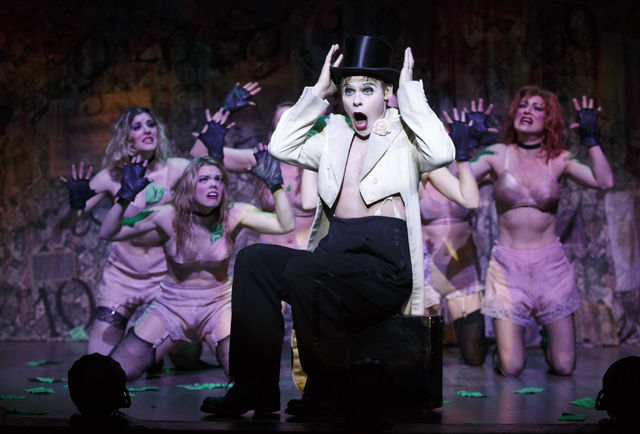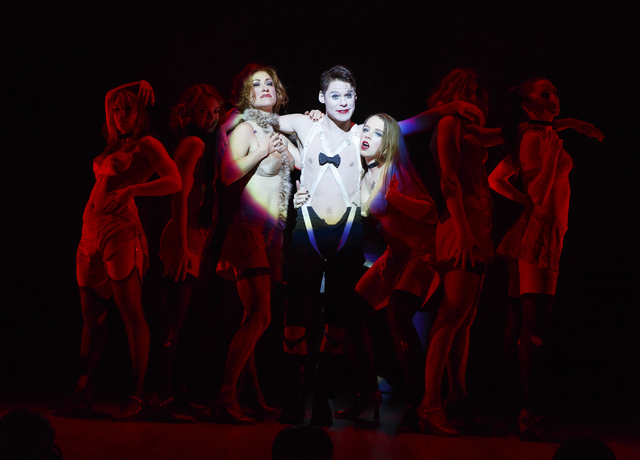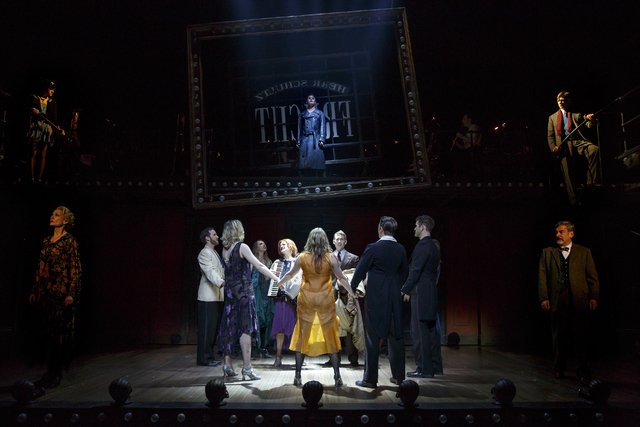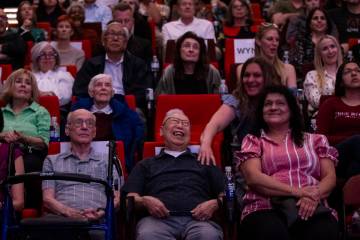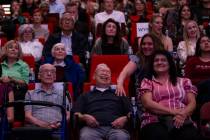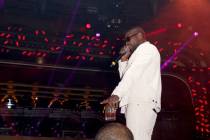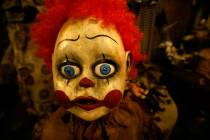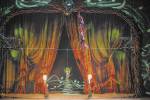‘Cabaret’ cunningly reflects contradictions of human nature
By all means, come to this “Cabaret.”
Just don’t expect to leave your troubles outside. It’s not that kind of musical.
Some productions of “Cabaret” — which captured a best musical Tony in 1966 and a best musical revival Tony in 1998 — sneak up on you, disarming you with a wink and a quicksilver smile that’s forever hovering on the edge of a snarl. Not this one.
At The Smith Center through Sunday, this touring version of the 2013 restaging of the 1998 revival (got all that?) isn’t much interested in anything resembling restraint.
From the get-go, it’s in your face, cheerfully — and defiantly — depicting the hell-bound hedonism of 1930 Berlin, as the let-it-all-hang-out excesses of Germany’s dying Weimar Republic are about to give way to a new nationalism, propagated by a political force the world would soon come to know as Nazism.
Any resemblance to our own fractured political landscape (or the fractured political landscape of the 1960s) is far from coincidental. But that’s only because “Cabaret” so cunningly reflects the inherent contradictions of human nature.
Inspired by Christopher Isherwood’s “Berlin Stories” (and John Van Druten’s aptly titled dramatization, “I Am a Camera”), “Cabaret” focuses on contrasting characters caught up in, but doing their best to overlook, the gathering maelstrom.
Some of them work at Berlin’s tawdry, beyond-titillating Kit Kat Klub, where the leering Master of Ceremonies (“Queer as Folk’s” slyly insinuating Randy Harrison) proves a gleeful, malevolent guide to the audience’s most shadowy desires, sexual and otherwise.
The Kit Kat Klub provides the initial meeting ground for “Cabaret’s” central couple: dissolute chanteuse Sally Bowles (reckless, feckless Amanda Goss), whose talents lie more in fast living than fast music; and aspiring writer Cliff Bradshaw (stalwart yet sensitive Lee Aaron Rosen), who’s about to find plenty of material for his new novel after he takes up with Sally.
Yet there’s another, more soothing side to “Cabaret,” one the 1972 movie version all but obliterated: a Berlin boarding house where Cliff (and, eventually, Sally) take refuge. It’s run by Fraulein Schneider (the beautifully rueful Shannon Cochran), whose romance with tenant Herr Schultz (Mark Nelson, in courtly mensch mode) may not survive the riding tide of anti-Semitism.
There are times when “Cabaret” betrays its mid-20th-century musical origins, from librettist Joe Masteroff’s tidy two-couple plot structure to John Kander and Fred Ebb’s finely crafted character songs — most of which the movie discarded, all the better to concentrate on the show’s forever-socko Kit Kat Klub numbers.
And director BT McNicholl (working from the template created by original revival directors Sam Mendes and Rob Marshall) takes his own sweet time getting things in gear, especially during the show’s long-sit first half.
Then again, it takes time to set us up for “Cabaret’s” second-act jolts, from Sally’s more desperate than jaunty rendition of the title song to the show’s final, haunting image — accompanied by the same relentless drumroll that first snaps “Cabaret” (and those of us in the audience) to attention.
By the time we hear that snare drum bringing the show to a close, the world has changed, irrevocably — and so have we. But never mind. As Cliff observes of life at the Kit Kat Klub, “It’s so tawdry and terrible, and everyone’s having such a great time.”
Read more stories from Carol Cling at reviewjournal.com. Contact her at ccling@reviewjournal.com and follow @CarolSCling on Twitter.
Review
What: Cabaret"
When: 7:30 p.m. through Sunday; also 2 p.m. Saturday and Sunday
Where: Reynolds Hall, The Smith Center for the Performing Arts, 361 Symphony Park Ave.
Tickets: $29-$129 (7020749-2000, thesmithcenter.com)
Grade: B+



